While Japan is best known for sake worldwide, it also has a killer whisky industry that’s lauded by spirit connoisseurs. Commercial whisky production in Japan began in October 1923, just a month after the massive Great Kanto Earthquake. With a parcel of land between Osaka and Kyoto, Shinjiro Torii built the now well-known Yamazaki Distillery, just outside Kyoto.
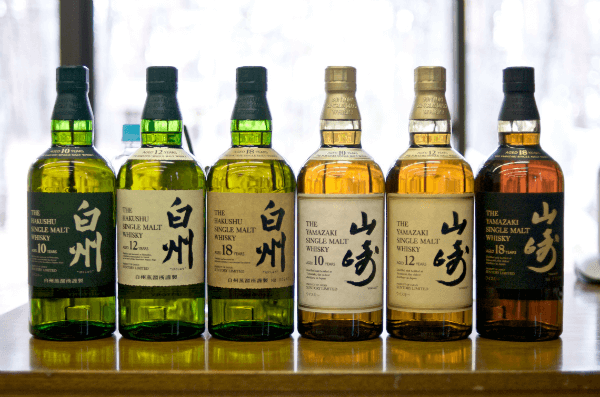
Anyone who’s seen Lost in Translation will fondly remember the scene in which actor Bob Harris (Bill Murray) is filming a commercial for Suntory whisky. This cameo launched the then relatively obscure whisky into pop culture.
JAPANESE WHISKY BASICS
To help you enjoy a glass or two of these exclusive Japanese spirits on your trip to Japan, we’ve written this primer on Japanese whisky.Special thanks are due to the diligent writers behind Nonjatta, a treasure trove of English-language information on Japanese whisky. Extra special thanks go out to Stefan Van Eycken for taking time away from writing his book to speak with us about Japanese whisky.
JAPANESE WHISKY VS. SCOTCH
Before we dug into the best places to enjoy Japanese whisky, we needed to know: what sets it apart from Scotch?Van Eycken filled us in: “In terms of producing the actual liquid, Japanese whisky follows the Scottish tradition and practice, but there are a few interesting twists. Suntory, for example, uses casks that previously contained umeshu [a Japanese liqueur made of ume fruits steeped in alcohol and sugar] to mature a certain amount of malt whisky that goes into making some of their high-profile single malts and blends.
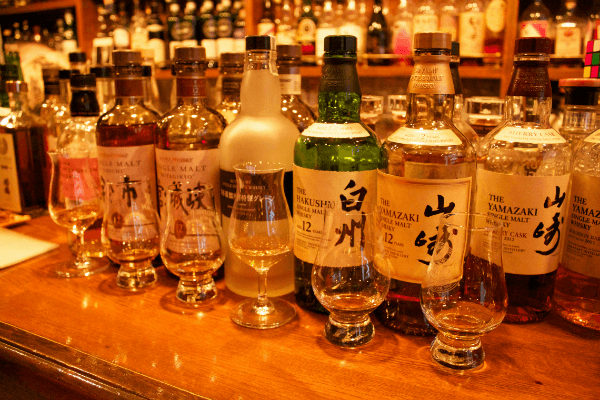
“Some producers in Japan also use Japanese oak (mizunara) to mature malt whisky, which imparts a very distinct taste and aroma (akin to Japanese temples, sandalwood, etc.). Unfortunately, mizunara is in very short supply, because it not only grows very slowly and in very limited geographical areas of Japan, but is also hard to work. That, combined with the mesmerizing aroma and taste, accounts for the very high price associated with mizunara releases.”Van Eycken added that, “Unlike in Scotland, producers [in Japan] do not swap stock, so every producer has to produce in-house the various types of malt (and grain) whisky needed for their products. In terms of blends, Japanese whisky producers generally aim to create products that work well, [such as] mizuwari (i.e. drunk long with water) and highball (i.e. with soda) style, since that is the way most whisky is drunk [in Japan].”
VISITING WHISKY DISTILLERIES IN JAPAN
One of the best ways to immerse yourself in the world of Japanese whisky is to visit a distillery.The big whisky brands in Japan are Yamazaki, Hakushu, and Hibiki (all owned by Suntory), Yoichi and Miyakigo (owned by Nikka), Fuji Gotemba (owned by Kirin), Chichibu, and the elusive White Oak.We’ve chosen three Japanese whisky distilleries that are easy to reach from Tokyo, Kyoto, and Osaka.
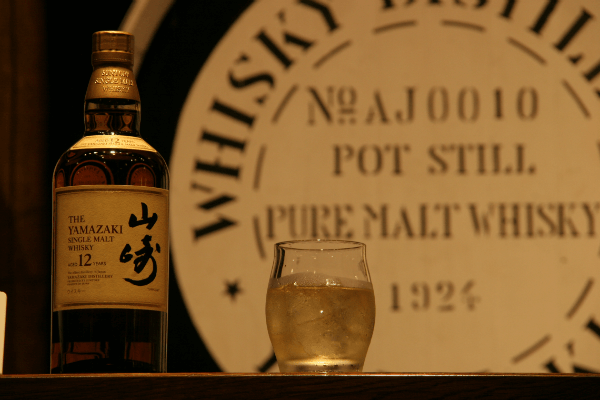
YAMAZAKI DISTILLERY
Located conveniently in between the cities of Kyoto and Osaka, Yamazaki Distillery runs tours thrice daily (10:30 am, 11:50 am, and 2:50 pm). The 80-minute tours (¥1,000) are an incredible value: they include a guided tour of the production facilities, and tastings of Yamazaki distiller’s reserve and Yamazaki unblended whisky. The latter is not for sale itself, but rather part of Yamazaki single malt whisky. If you can’t get on a tour, entry to the museum is free.Note: Reservations are essential. Getting there: Take the Tokaido-Sanyo Line from either Kyoto Station (approximately 20 minutes) or Osaka Station (approximately 37 minutes).
HAKUSHU DISTILLERY
Hakushu Distillery, also owned by Suntory, is exactly the same deal as Yamazaki, but with four weekday tours and five on weekends and holidays. The brewery is located in a lovely and verdant mountain setting in the Japanese Southern Alps. It’s possible to make a day trip from Tokyo (approximately 2.5 hours on the train), but staying overnight will make for an even better experience.Note: Reservations are essential. Getting there: Take the Limited Express Azusa from Shinjuku Station (2 hours) or the JR Chuo Line, either to Kobuchizawa station. You can then either walk or take a quick cab ride to the distillery.
FUJI GOTEMBA DISTILLERY
Fuji Gotemba runs free hour-long tours every day, for which no reservation is required. The town is in Gotemba, at the foot of Mount Fuji, and a distillery visit is a great complement to a Fuji hike. The tour includes a look at Fuji Gotemba’s production process and a tasting. The English signage here is quite good, and a few staff members speak English as well. The gift shop is good for snapping up a few souvenirs.Getting there: Depending on departure time, there are a few options. All start with taking the Shinkansen Kodama from Tokyo Station. See HyperDia for more details.
WHISKY BARS IN TOKYO, KYOTO & OSAKA
Even if you can’t make it to a distillery, Japan is a whisky lover’s paradise.Apart from the fact that you can easily find wonderful Japanese whiskies on store shelves (which also make great gifts), Japanese cities are full of one-of-a-kind establishments specializing in whisky.
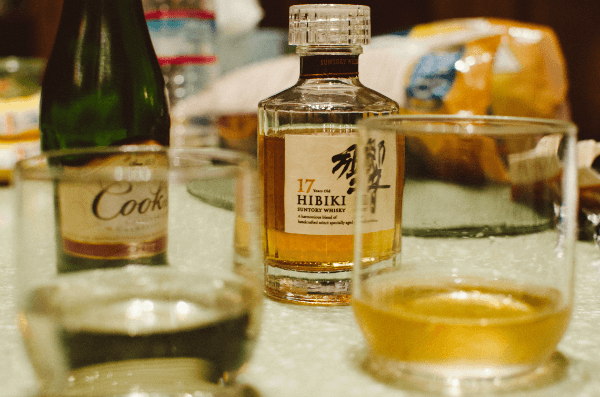
TOKYO WHISKY BARS
See our guide to One Day in TokyoWe asked Van Eycken for a few of his favorite Tokyo whisky bars. These are his suggestions:“For Japanese whisky, there is no place better than Zoetrope in Shinjuku. The selection is second to none, and the owner, Atsushi Horigami, knows the field better than anyone, so it’s not only fun to work your way through recent whiskies as well as stuff from yesteryear, but it also provides a great learning experience!”“My regular haunt is Malt Bar South Park in Shinjuku, a 15-minute walk from Nakano station. The owner, Osamu Futakata, started this bar because his personal whisky collection was becoming a bit too large for comfort. Of the 3,000+ bottles he has accumulated over the years as a collector, about half are now at Malt Bar South Park, including a nice selection of Japanese whiskies.”“Two other bars (which are sister bars) I love to go to are Cast Strength and Wodka Tonic, in the Roppongi/Azabu area. They have a plethora of really old bottlings that you would have a hard time finding anywhere else in the world, and the best thing is: you can try them without having to take out another mortgage. They’re within walking distance, and the fresh air helps to reset the mind and palate, so what’s not to love?”
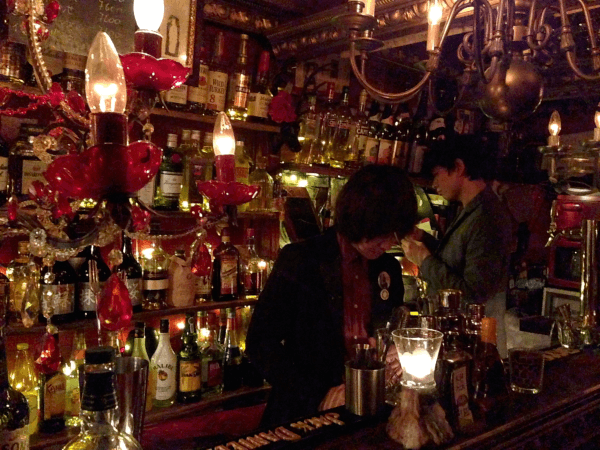
And here are just a few of our favorite whisky bars in Kyoto and Osaka:
KYOTO WHISKY BARS
See our guide to Three Days in Kyoto
BAR K6
Above a members-only whisky spot called Bar Keller, and right next to The Ritz-Carlton, is Bar K6, an ultra popular neighborhood watering hole. It has an excellent selection of single malt whisky, a cocktail menu (if you need a break from whisky, try a sake cocktail), and, if you’re really craving a taste of home, even craft beers like Brooklyn-based Sixpoint. There’s a small selection of bar bites here, including toast topped with mascarpone and honey.
BAR CORDON NOIR
If you only have time for one whisky bar while visiting Kyoto, make it Bar Cordon Noir. There are 30-odd seats at this low-lit bar, so it’s intimate without feeling cramped, and service is fantastic. Several hundred whiskies are available here, including a number that won’t be found in the States.
OSAKA WHISKY BARS
SUNTORY WHISKY HOUSE
This is a great place to sit down and try several whiskies while tucking into an excellent meal. That they’re open for lunch doesn’t hurt – after all, you’re on vacation. Vegetarians will likely want to come here only for drinks, as the menu is heavy on meat. Go for the tasting board; you can choose from all Japanese whiskies or opt for a tasting of several from around the world.
BAR AUGUSTA TARLOGIE
What sets this 16-seat bar apart from other popular whisky bars is that it’s non-smoking, which is a nice change from the smokey izakaya you’ve likely been visiting. The bar is so well stocked with Japanese whisky that it doubles as the Osaka branch of the Japan chapter of the Scotch Malt Whisky Society.
BAR K
That it’s a little hard to find makes it even more fun once you’re there (look for the big letter K out front). The low-lit 20-seat Bar K is a smoking bar, and there’s a cover charge of ¥600, but the service is impeccable and some of the staffers speak English, which is helpful if you want to order a complicated drink. Beyond Japanese (and foreign) whiskies, You’ll find 20-odd cocktails, like the Nightcap in Osaka, made with cream, matcha, red bean, and cognac.
Credits to: http://boutiquejapan.com/whisky-in-japan/
Thanks for reading!
Excellent and informative read. I have not yet had Japanese whiskey, but I certainly intend to. The umeshu casks sound quite interesting. Do you have any strong recommendations for Japanese single malts that are generally available in North America? I'd like to try it out, and perhaps even talk about it in my new Fifty Tastes of Whisky series.
Downvoting a post can decrease pending rewards and make it less visible. Common reasons:
Submit